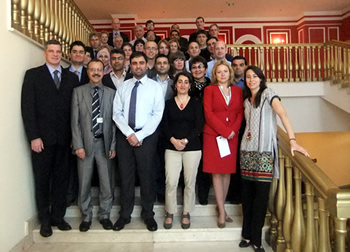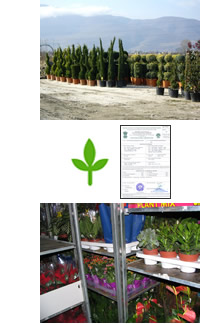
 EPPO/NEPPO Workshop on ISPMs nos. 7 and 12
EPPO/NEPPO Workshop on ISPMs nos. 7 and 12 
Toward an harmonized implementation of International Standards for Phytosanitary Measures
no. 7 ‘Phytosanitary Certification System’ and no. 12 ‘Phytosanitary Certificates’
(Antalya, TR, 2012-11-20/22)
ISPM No. 7 ‘Phytosanitary Certification System’ and No. 12 ‘Phytosanitary Certificates’ are important for the daily work of NPPOs, but these 2 international standards may in some cases be implemented in different ways. It is therefore necessary to harmonize the way in which these Standards are implemented. Thirty six participants attended from 22 countries.

Workshop participants – View more pictures ![]()
The Workshop was organized as a series of lectures followed by group discussions on the following topics:
The difficulties related to implementation of ISPM 12, in particular:
 Need to clarify the purpose of phytosanitary certificates in issuing export or re-export certificates (1.1 of ISPM No. 12);
Need to clarify the purpose of phytosanitary certificates in issuing export or re-export certificates (1.1 of ISPM No. 12);- Attachments of phytosanitary certificates (1.3 of ISPM No. 12);
- Certified copies of phytosanitary certificates (2.1 of ISPM No. 12);
- Replacement of phytosanitary certificates (2.2 of ISPM No. 12);
- Alterations of phytosanitary certificates (2.3 of ISPM No. 12);
- Issuance of phytosanitary certificates after dispatch (4 of ISPM No. 12);
- Declared means of conveyance, Number and description of packages, Distinguishing marks (5 of ISPM No. 12);
- Use of recommended wording for additional declaration (Appendix 2 of ISPM No. 12);
- Considerations of re-export situations and transit (6 of ISPM No. 12).
Toward a harmonized implementation and a common understanding of ISPM 7:
- Information on importing country phytosanitary requirements (3.2 of ISPM No. 7);
- Technical information (3.3 of ISPM No. 7);
- Phytosanitary certificate of re-export (4.2 of ISPM No. 7);
- Procedures (4.3 of ISPM No. 7);
- Need for further detail on which tasks staff should undertake (3.1 and Appendix 1 of ISPM No. 7).
Further developments of ISPM 12:
- Development of the Electronic certification, information on standard XML schemes and exchange mechanisms (Appendix 1 of ISPM No. 12).
Workshop recommendations and observations
Taking into consideration the discussions, the Workshop participants agreed upon the following recommendations and observations:
- The revised ISPMs 7 & 12 are very complete and cover most of the relevant issues of phytosanitary export certification. New elements of the revised ISPM 7 & 12 (e.g. issue after dispatch, replacement certificate) have already been implemented by countries.
- Re-export and transit situations are diverse and complex and some elements are described in ISPM 12 in a complicated way. The principles are all covered in the standard however, it is recognized that not all practical cases can be described in an international standard.
- It is recommended that, on a national level, instructions are produced and made available to inspectors to help them in practical situations of issuance of PC. Furthermore a manual should be produced on a regional or global level with concrete advice on how to implement the principles described in the standard as guidance to NPPOs inspectors. If such a manual is produced, a proper consultation amongst NPPOs is required to ensure broad applicability and acceptance.
- Differences in practices in export and re-export situations in countries were noted by participants (e.g. distinguishing marks, country of origin, declared means of conveyance, facilitation of re-export, issuance of PC for export by countries other than those of origin, bilateral arrangements between countries of origin and countries of re-export for information exchange, e.g. on growing season inspection). These were clarified according to the guidance of ISPM 12.
- Countries are strongly encouraged to fully implement ISPM 12 and its principles and to work together on a harmonized implementation.
- Global guidelines should be developed to assist NPPOs in the setting up of electronic-certification systems in their countries. EPPO and NEPPO are requested to organize a workshop to improve understanding of electronic certification.
- ISPM 7 clearly describes the elements of phytosanitary certification systems but these are not always fully applied by countries. Countries are encouraged to improve their systems (e.g. notifying an import requirement, time of notification, and availability of PC models).
Presentations
Introduction
The International Plant Protection Convention (IPPC) and International Standards for Phytosanitary Measures (ISPMs), EPPO and its activities, aims of the workshop
Mr Arnitis, Director-General of EPPO
NEPPO and its activities
Mr Chouibani, Director-General of NEPPO
Presentation of the scope, history, basic elements of ISPM 7 and 12 and latest developments
Mr Unger, Julius Kühn Institut (JKI), Germany and Mr. Horn, Plant Protection Service of the Netherlands
Basic elements of ISPM 12
Mr Horn, Plant Protection Service of the Netherlands
Exchange of practice and of understanding of ISPMs 7 & 12 across countries
Implementation of ISPM 7 & 12 in Turkey
Mr Birisik, Ministry of Food Agriculture and Livestock, Turkey
Implementation of ISPM No.7 and No.12 in France at the national and regional level
Ms Pacheco, Ministère de l'agriculture, de l'agroalimentaire et de la forêt, France
ISPM 12 implementation and the current worldwide implementation. The Italian experience
Mr Finelli, Servizio Fitosanitario Regione Emilia-Romagna, Italy
Application of international standards for phytosanitary measures ISPMs 7 and 12 in practical work of the Services ensuring plant quarantine in the Customs Union
Mr Tryakhov, Eurasian Economic Commission (RU)
Implementation of ISPM 7 & 12 in Latvia
Ms Kjago, State Plant Protection Service, Latvia
Implementation of ISPM 7 & 12 in Algeria
Ms Ziouche, Ministry of agriculture of Algeria
Implementation of ISPM 7 & 12 in the Netherlands
Mr Horn, Plant Protection Service of the Netherlands
Toward an harmonized implementation and a common understanding of ISPM 7 and further developments of ISPM 12
Export certification: a UK perspective
Mr Kilby, Food & Environment Research Agency, UK
Issuing Phytosanitary certificates in Switzerland
Mr von Felten, Swiss Federal Plant Protection Service SPPS
Implementation of e-phytosanitary certificates
Mr Horn, Plant Protection Service of the Netherlands
